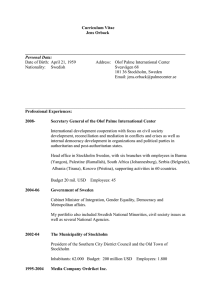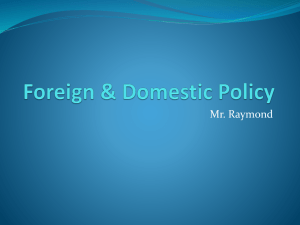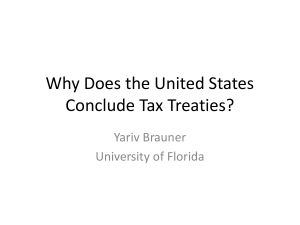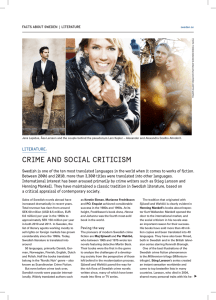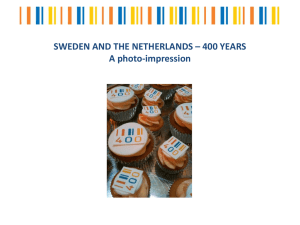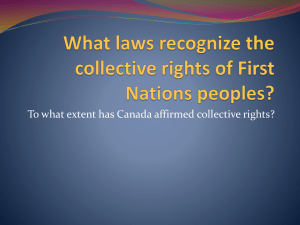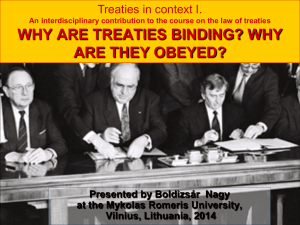Presentation
advertisement
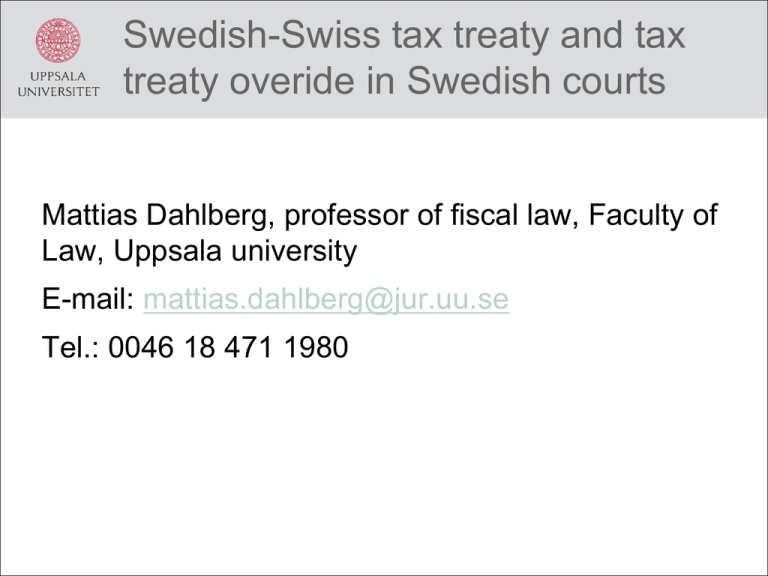
Swedish-Swiss tax treaty and tax treaty overide in Swedish courts Mattias Dahlberg, professor of fiscal law, Faculty of Law, Uppsala university E-mail: mattias.dahlberg@jur.uu.se Tel.: 0046 18 471 1980 Swedish approach to tax treaties • Tax treaties are bilateral or multilateral treaties • Treaties of international law • Sweden is a dualistic country in relation to international treaties • ”Golden rule” of Swedish tax treaty law: treaties can only limit, never extend Sweden’s taxing rights according to (strictly) internal law The 1965 tax treaty between Sweden and Switzerland • In general: an old treaty with a general need for revision • No exchange of information according to the treaty, only limited exchange according to the protocol Recent Swedish case law on the Swedish-Swiss tax treaty • The Swedish Supreme Administrative Court (”Regeringsrätten”) has decided on the compatibility of the Swedish CFC legislation (2004) with the Swedish-Swiss tax treaty, RÅ 2008 ref. 24. • CFC = Controlled foreign company. CFC taxation means the taxation of Swedish owners of foreign low-taxed companies concerning undistributed profits. RÅ 2008 ref. 24 (cont.) • The Swedish Supreme Administrative Court identified a potential conflict between the Swedish-Swiss tax treaty and the Swedish CFC legislation. • When deciding which legislation should prevail, the Supr. Adm. Court concluded that the CFC legislation was both lex specialis (’more special’) and lex posterior (’later in time’) than the 1965 tax treaty. Consequently, the CFC legislation should prevail. Critical comment • Tax treaties are instruments of international law, and Sweden’s tax treaties express not only Sweden’s objectives but also the objectives of the other treaty concluding state, in this case Switzerland. • Cf. Articles 27 and 31 of the Vienna Convention on the Law of Treaties. • In this case the Supreme Adm. Court has wrongly ignored the other treaty concluding state. The Swedish ”ten year rule” • An individual resident in Sweden that transfers his or her residence from Sweden will be liable to tax in Sweden on capital gains from the alienation of shares and similar instruments, during a period of ten years from the transfer of residence. Oftenly, this period is reduced in Swedish tax treaties. • In 2007 the internal Swedish rule was extended to include also certain foreign financial instruments. The Swedish ”ten year rule” (cont.) • The question is whether this extension to foreign instruments ”overrides” Swedish tax treaties, which oftenly limit the period for tax liability in Sweden on capital gains on the alienation of SWEDISH shares. • The Swedish Board for Advance Tax Rulings (”Skatterättsnämnden”) has in two cases, one concerning Switzerland, decided that the extended national rule should prevail over the Swedish tax treaties. Conclusions • The 1965 Swedish tax treaty is in need of revision. • The Swedish Supreme Administrative Court case from 2008 on the Swedish-Swiss tax treaty constitutes a tax treaty override. It means that the lex posterior and lex specialis principles should prevail irrespective of the view of the treaty partner. In my view, a breach of Sweden’s international obligations.
